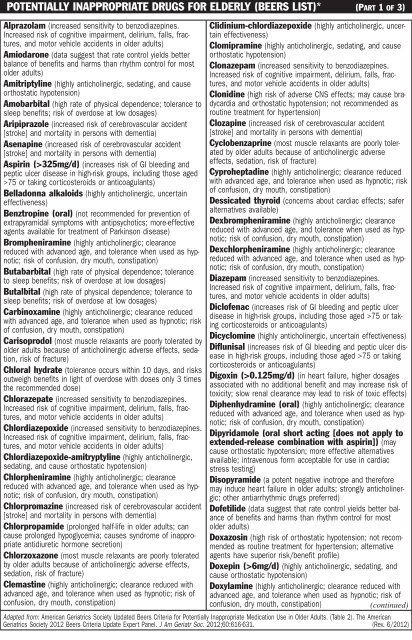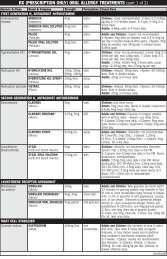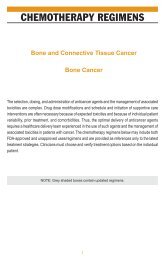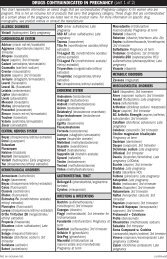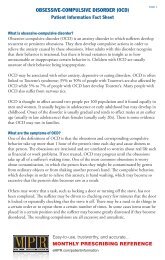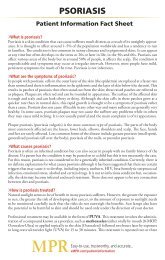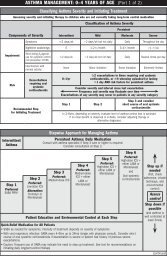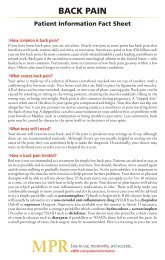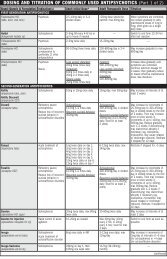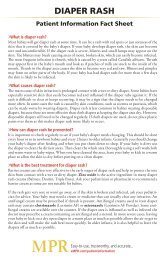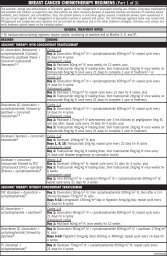potentially inappropriate drugs for elderly (beers list) - MPR
potentially inappropriate drugs for elderly (beers list) - MPR
potentially inappropriate drugs for elderly (beers list) - MPR
You also want an ePaper? Increase the reach of your titles
YUMPU automatically turns print PDFs into web optimized ePapers that Google loves.
POTENTIALLY INAPPROPRIATE DRUGS FOR ELDERLY (BEERS LIST)* (PART 1 OF 3)<br />
Alprazolam (increased sensitivity to benzodiazepines.<br />
Increased risk of cognitive impairment, delirium, falls, fractures,<br />
and motor vehicle accidents in older adults)<br />
Amiodarone (data suggest that rate control yields better<br />
balance of benefits and harms than rhythm control <strong>for</strong> most<br />
older adults)<br />
Amitriptyline (highly anticholinergic, sedating, and cause<br />
orthostatic hypotension)<br />
Amobarbital (high rate of physical dependence; tolerance to<br />
sleep benefits; risk of overdose at low dosages)<br />
Aripiprazole (increased risk of cerebrovascular accident<br />
[stroke] and mortality in persons with dementia)<br />
Asenapine (increased risk of cerebrovascular accident<br />
[stroke] and mortality in persons with dementia)<br />
Aspirin (>325mg/d) (increases risk of GI bleeding and<br />
peptic ulcer disease in high-risk groups, including those aged<br />
>75 or taking corticosteroids or anticoagulants)<br />
Belladonna alkaloids (highly anticholinergic, uncertain<br />
effectiveness)<br />
Benztropine (oral) (not recommended <strong>for</strong> prevention of<br />
extrapyramidal symptoms with antipsychotics; more-effective<br />
agents available <strong>for</strong> treatment of Parkinson disease)<br />
Brompheniramine (highly anticholinergic; clearance<br />
reduced with advanced age, and tolerance when used as hypnotic;<br />
risk of confusion, dry mouth, constipation)<br />
Butabarbital (high rate of physical dependence; tolerance<br />
to sleep benefits; risk of overdose at low dosages)<br />
Butalbital (high rate of physical dependence; tolerance to<br />
sleep benefits; risk of overdose at low dosages)<br />
Carbinoxamine (highly anticholinergic; clearance reduced<br />
with advanced age, and tolerance when used as hypnotic; risk<br />
of confusion, dry mouth, constipation)<br />
Carisoprodol (most muscle relaxants are poorly tolerated by<br />
older adults because of anticholinergic adverse effects, sedation,<br />
risk of fracture)<br />
Chloral hydrate (tolerance occurs within 10 days, and risks<br />
outweigh benefits in light of overdose with doses only 3 times<br />
the recommended dose)<br />
Chlorazepate (increased sensitivity to benzodiazepines.<br />
Increased risk of cognitive impairment, delirium, falls, fractures,<br />
and motor vehicle accidents in older adults)<br />
Chlordiazepoxide (increased sensitivity to benzodiazepines.<br />
Increased risk of cognitive impairment, delirium, falls, fractures,<br />
and motor vehicle accidents in older adults)<br />
Chlordiazepoxide-amitryptyline (highly anticholinergic,<br />
sedating, and cause orthostatic hypotension)<br />
Chlorpheniramine (highly anticholinergic; clearance<br />
reduced with advanced age, and tolerance when used as hypnotic;<br />
risk of confusion, dry mouth, constipation)<br />
Chlorpromazine (increased risk of cerebrovascular accident<br />
[stroke] and mortality in persons with dementia)<br />
Chlorpropamide (prolonged half-life in older adults; can<br />
cause prolonged hypoglycemia; causes syndrome of <strong>inappropriate</strong><br />
antidiuretic hormone secretion)<br />
Chlorzoxazone (most muscle relaxants are poorly tolerated<br />
by older adults because of anticholinergic adverse effects,<br />
sedation, risk of fracture)<br />
Clemastine (highly anticholinergic; clearance reduced with<br />
advanced age, and tolerance when used as hypnotic; risk of<br />
confusion, dry mouth, constipation)<br />
Clidinium-chlordiazepoxide (highly anticholinergic, uncertain<br />
effectiveness)<br />
Clomipramine (highly anticholinergic, sedating, and cause<br />
orthostatic hypotension)<br />
Clonazepam (increased sensitivity to benzodiazepines.<br />
Increased risk of cognitive impairment, delirium, falls, fractures,<br />
and motor vehicle accidents in older adults)<br />
Clonidine (high risk of adverse CNS effects; may cause bradycardia<br />
and orthostatic hypotension; not recommended as<br />
routine treatment <strong>for</strong> hypertension)<br />
Clozapine (increased risk of cerebrovascular accident<br />
[stroke] and mortality in persons with dementia)<br />
Cyclobenzaprine (most muscle relaxants are poorly tolerated<br />
by older adults because of anticholinergic adverse<br />
effects, sedation, risk of fracture)<br />
Cyproheptadine (highly anticholinergic; clearance reduced<br />
with advanced age, and tolerance when used as hypnotic; risk<br />
of confusion, dry mouth, constipation)<br />
Dessicated thyroid (concerns about cardiac effects; safer<br />
alternatives available)<br />
Dexbrompheniramine (highly anticholinergic; clearance<br />
reduced with advanced age, and tolerance when used as hypnotic;<br />
risk of confusion, dry mouth, constipation)<br />
Dexchlorpheniramine (highly anticholinergic; clearance<br />
reduced with advanced age, and tolerance when used as hypnotic;<br />
risk of confusion, dry mouth, constipation)<br />
Diazepam (increased sensitivity to benzodiazepines.<br />
Increased risk of cognitive impairment, delirium, falls, fractures,<br />
and motor vehicle accidents in older adults)<br />
Diclofenac (increases risk of GI bleeding and peptic ulcer<br />
disease in high-risk groups, including those aged >75 or taking<br />
corticosteroids or anticoagulants)<br />
Dicyclomine (highly anticholinergic, uncertain effectiveness)<br />
Diflunisal (increases risk of GI bleeding and peptic ulcer disease<br />
in high-risk groups, including those aged >75 or taking<br />
corticosteroids or anticoagulants)<br />
Digoxin (>0.125mg/d) (in heart failure, higher dosages<br />
associated with no additional benefit and may increase risk of<br />
toxicity; slow renal clearance may lead to risk of toxic effects)<br />
Diphenhydramine (oral) (highly anticholinergic; clearance<br />
reduced with advanced age, and tolerance when used as hypnotic;<br />
risk of confusion, dry mouth, constipation)<br />
Dipyridamole (oral short acting [does not apply to<br />
extended-release combination with aspirin]) (may<br />
cause orthostatic hypotension; more effective alternatives<br />
available; intravenous <strong>for</strong>m acceptable <strong>for</strong> use in cardiac<br />
stress testing)<br />
Disopyramide (a potent negative inotrope and there<strong>for</strong>e<br />
may induce heart failure in older adults; strongly anticholinergic;<br />
other antiarrhythmic <strong>drugs</strong> preferred)<br />
Dofetilide (data suggest that rate control yields better balance<br />
of benefits and harms than rhythm control <strong>for</strong> most<br />
older adults)<br />
Doxazosin (high risk of orthostatic hypotension; not recommended<br />
as routine treatment <strong>for</strong> hypertension; alternative<br />
agents have superior risk/benefit profile)<br />
Doxepin (>6mg/d) (highly anticholinergic, sedating, and<br />
cause orthostatic hypotension)<br />
Doxylamine (highly anticholinergic; clearance reduced with<br />
advanced age, and tolerance when used as hypnotic; risk of<br />
confusion, dry mouth, constipation)<br />
(continued)<br />
Adapted from: American Geriatrics Society Updated Beers Criteria <strong>for</strong> Potentially Inappropriate Medication Use in Older Adults. (Table 2). The American<br />
Geriatrics Society 2012 Beers Criteria Update Expert Panel. J Am Geriatr Soc. 2012;60:616-631. (Rev. 6/2012)
POTENTIALLY INAPPROPRIATE DRUGS FOR ELDERLY (BEERS LIST)* (PART 2 OF 3)<br />
Dronedarone (worse outcomes have been reported in<br />
patients taking dronedarone who have permanent atrial fibrillation<br />
or heart failure)<br />
Ergot mesylates (lack of efficacy)<br />
Estazolam (increased sensitivity to benzodiazepines.<br />
Increased risk of cognitive impairment, delirium, falls, fractures,<br />
and motor vehicle accidents in older adults)<br />
Estrogens with or without progestins (evidence of carcinogenic<br />
potential [breast and endometrium]; lack of cardioprotective<br />
effect and cognitive protection in older women)<br />
Eszopiclone (adverse effects similar to those of benzodiazepines<br />
(eg, delirium, falls, fractures); minimal improvement in<br />
sleep latency and duration)<br />
Etodolac (increases risk of GI bleeding and peptic ulcer disease<br />
in high-risk groups, including those aged >75 or taking<br />
corticosteroids or anticoagulants)<br />
Fenoprofen (increases risk of GI bleeding and peptic ulcer<br />
disease in high-risk groups, including those aged >75 or taking<br />
corticosteroids or anticoagulants)<br />
Flecainide (data suggest that rate control yields better balance<br />
of benefits and harms than rhythm control <strong>for</strong> most<br />
older adults)<br />
Fluphenazine (increased risk of cerebrovascular accident<br />
[stroke] and mortality in persons with dementia)<br />
Flurazepam (increased sensitivity to benzodiazepines.<br />
Increased risk of cognitive impairment, delirium, falls, fractures,<br />
and motor vehicle accidents in older adults)<br />
Glyburide (greater risk of severe prolonged hypoglycemia in<br />
older adults)<br />
Growth hormone (effect of body composition is small and<br />
associated with edema, arthralgia, carpal tunnel syndrome,<br />
gynecomastia, impaired fasting glucose)<br />
Guanabenz (high risk of adverse CNS effects; may cause<br />
bradycardia and orthostatic hypotension; not recommended as<br />
routine treatment <strong>for</strong> hypertension)<br />
Guanfacine (high risk of adverse CNS effects; may cause<br />
bradycardia and orthostatic hypotension; not recommended as<br />
routine treatment <strong>for</strong> hypertension)<br />
Haloperidol (increased risk of cerebrovascular accident<br />
[stroke] and mortality in persons with dementia)<br />
Hydroxyzine (highly anticholinergic; clearance reduced with<br />
advanced age, and tolerance when used as hypnotic; risk of<br />
confusion, dry mouth, constipation)<br />
Hyoscyamine (highly anticholinergic, uncertain effectiveness)<br />
Ibuprofen (increases risk of GI bleeding and peptic ulcer<br />
disease in high-risk groups, including those aged >75 or taking<br />
corticosteroids or anticoagulants)<br />
Ibutilide (data suggest that rate control yields better balance<br />
of benefits and harms than rhythm control <strong>for</strong> most older<br />
adults)<br />
Iloperidone (increased risk of cerebrovascular accident<br />
[stroke] and mortality in persons with dementia)<br />
Imipramine (highly anticholinergic, sedating, and cause<br />
orthostatic hypotension)<br />
Indomethacin (increases risk of GI bleeding and peptic<br />
ulcer disease in high-risk groups, including those aged >75 or<br />
taking corticosteroids or anticoagulants)<br />
Insulin (sliding scale) (higher risk of hypoglycemia without<br />
improvement in hyperglycemia management regardless of care<br />
setting)<br />
Isoxsuprine (lack of efficacy)<br />
Ketoprofen (increases risk of GI bleeding and peptic ulcer<br />
disease in high-risk groups, including those aged >75 or taking<br />
corticosteroids or anticoagulants)<br />
Ketorolac (includes parenteral) (increases risk of<br />
GI bleeding and peptic ulcer disease in high-risk groups,<br />
including those aged >75 or taking corticosteroids or anticoagulants)<br />
Lorazepam (increased sensitivity to benzodiazepines.<br />
Increased risk of cognitive impairment, delirium, falls, fractures,<br />
and motor vehicle accidents in older adults)<br />
Loxapine (increased risk of cerebrovascular accident [stroke]<br />
and mortality in persons with dementia)<br />
Lurasidone (increased risk of cerebrovascular accident<br />
[stroke] and mortality in persons with dementia)<br />
Meclofenamate (increases risk of GI bleeding and peptic<br />
ulcer disease in high-risk groups, including those aged >75 or<br />
taking corticosteroids or anticoagulants)<br />
Mefenamic acid (increases risk of GI bleeding and peptic<br />
ulcer disease in high-risk groups, including those aged >75 or<br />
taking corticosteroids or anticoagulants)<br />
Megestrol (minimal effect on weight; increases risk of<br />
thrombotic events and possibly death in older adults)<br />
Meloxicam (increases risk of GI bleeding and peptic ulcer<br />
disease in high-risk groups, including those aged >75 or taking<br />
corticosteroids or anticoagulants)<br />
Meperidine (not an effective oral analgesic in dosages<br />
commonly used; may cause neurotoxicity; safer alternatives<br />
available)<br />
Mephobarbital (high rate of physical dependence; tolerance<br />
to sleep benefits; risk of overdose at low dosages)<br />
Meprobamate (high rate of physical dependence; very<br />
sedating)<br />
Mesoridazine (highly anticholinergic and risk of QT-interval<br />
prolongation)<br />
Metaxalone (most muscle relaxants are poorly tolerated by<br />
older adults because of anticholinergic adverse effects, sedation,<br />
risk of fracture)<br />
Methocarbamol (most muscle relaxants are poorly tolerated<br />
by older adults because of anticholinergic adverse<br />
effects, sedation, risk of fracture)<br />
Methyldopa (high risk of adverse CNS effects; may cause<br />
bradycardia and orthostatic hypotension; not recommended as<br />
routine treatment <strong>for</strong> hypertension)<br />
Methyltestosterone (potental <strong>for</strong> cardiac problems and<br />
contraindicated in men with prostate cancer)<br />
Metoclopramide (can cause extrapyramidal effects including<br />
tardive dyskinesia; risk may be even greater in frail older<br />
adults)<br />
Mineral oil (oral) (potential <strong>for</strong> aspiration and adverse<br />
effects; safer alternatives available)<br />
Molindone (increased risk of cerebrovascular accident<br />
[stroke] and mortality in persons with dementia)<br />
Nabumetone (increases risk of GI bleeding and peptic ulcer<br />
disease in high-risk groups, including those aged >75 or taking<br />
corticosteroids or anticoagulants)<br />
Naproxen (increases risk of GI bleeding and peptic ulcer disease<br />
in high-risk groups, including those aged >75 or taking<br />
corticosteroids or anticoagulants)<br />
(continued)<br />
Adapted from: American Geriatrics Society Updated Beers Criteria <strong>for</strong> Potentially Inappropriate Medication Use in Older Adults. (Table 2). The American<br />
Geriatrics Society 2012 Beers Criteria Update Expert Panel. J Am Geriatr Soc. 2012;60:616-631. (Rev. 6/2012)
POTENTIALLY INAPPROPRIATE DRUGS FOR ELDERLY (BEERS LIST)* (PART 3 OF 3)<br />
Nifedipine (immediate release) (potential <strong>for</strong> hypotension;<br />
risk of precipitating myocardial ischemia)<br />
Nitrofurantoin (potential <strong>for</strong> pulmonary toxicity; safer<br />
alternatives available; lack of efficacy in patients with<br />
CrCl75 or taking<br />
corticosteroids or anticoagulants)<br />
Oxazepam (increased sensitivity to benzodiazepines.<br />
Increased risk of cognitive impairment, delirium, falls, fractures,<br />
and motor vehicle accidents in older adults)<br />
Paliperidone (increased risk of cerebrovascular accident<br />
[stroke] and mortality in persons with dementia)<br />
Pentazocine (opioid analgesic that causes CNS adverse<br />
effects, including confusion and hallucinations, more commonly<br />
than other narcotic <strong>drugs</strong>)<br />
Pentobarbital (high rate of physical dependence; tolerance<br />
to sleep benefits; risk of overdose at low dosages)<br />
Perphenazine (increased risk of cerebrovascular accident<br />
[stroke] and mortality in persons with dementia)<br />
Perphenazine-amitriptyline (highly anticholinergic, sedating,<br />
and cause orthostatic hypotension)<br />
Phenobarbital (high rate of physical dependence; tolerance<br />
to sleep benefits; risk of overdose at low dosages)<br />
Pimozide (increased risk of cerebrovascular accident [stroke]<br />
and mortality in persons with dementia)<br />
Piroxicam (increases risk of GI bleeding and peptic ulcer<br />
disease in high-risk groups, including those aged >75 or taking<br />
corticosteroids or anticoagulants)<br />
Prazosin (high risk of orthostatic hypotension; not recommended<br />
as routine treatment <strong>for</strong> hypertension; alternative<br />
agents have superior risk/benefit profile)<br />
Procainamide (data suggest that rate control yields better<br />
balance of benefits and harms than rhythm control <strong>for</strong> most<br />
older adults)<br />
Promazine (increased risk of cerebrovascular accident<br />
[stroke] and mortality in persons with dementia)<br />
Promethazine (highly anticholinergic; clearance reduced<br />
with advanced age, and tolerance when used as hypnotic; risk<br />
of confusion, dry mouth, constipation)<br />
Propafenone (data suggest that rate control yields better<br />
balance of benefits and harms than rhythm control <strong>for</strong> most<br />
older adults)<br />
Propantheline (highly anticholinergic, uncertain effectiveness)<br />
Quazepam (increased sensitivity to benzodiazepines.<br />
Increased risk of cognitive impairment, delirium, falls, fractures,<br />
and motor vehicle accidents in older adults)<br />
Quetiapine (increased risk of cerebrovascular accident<br />
[stroke] and mortality in persons with dementia)<br />
Quinidine (data suggest that rate control yields better balance<br />
of benefits and harms than rhythm control <strong>for</strong> most<br />
older adults)<br />
Reserpine (>0.1mg/d) (high risk of adverse CNS effects;<br />
may cause bradycardia and orthostatic hypotension; not recommended<br />
as routine treatment <strong>for</strong> hypertension)<br />
Risperidone (increased risk of cerebrovascular accident<br />
[stroke] and mortality in persons with dementia)<br />
Scopolamine (highly anticholinergic, uncertain effectiveness)<br />
Secobarbital (high rate of physical dependence; tolerance<br />
to sleep benefits; risk of overdose at low dosages)<br />
Sotalol (data suggest that rate control yields better balance<br />
of benefits and harms than rhythm control <strong>for</strong> most older<br />
adults)<br />
Spironolactone (>25mg/d) (in heart failure, the risk of<br />
hyperkalemia is higher in older adults, esp. if taking >25mg/d<br />
or taking concomitant NSAID, ACE inhibitor, ARB, or K+ supplement)<br />
Sulindac (increases risk of GI bleeding and peptic ulcer disease<br />
in high-risk groups, including those aged >75 or taking<br />
corticosteroids or anticoagulants)<br />
Temazepam (increased sensitivity to benzodiazepines.<br />
Increased risk of cognitive impairment, delirium, falls, fractures,<br />
and motor vehicle accidents in older adults)<br />
Terazosin (high risk of orthostatic hypotension; not recommended<br />
as routine treatment <strong>for</strong> hypertension; alternative<br />
agents have superior risk/benefit profile)<br />
Testosterone (potental <strong>for</strong> cardiac problems and contraindicated<br />
in men with prostate cancer)<br />
Thioridazine (highly anticholinergic and risk of QT-interval<br />
prolongation)<br />
Thiothixene (increased risk of cerebrovascular accident<br />
[stroke] and mortality in persons with dementia)<br />
Ticlopidine (safer effective alternatives available)<br />
Tolmetin (increases risk of GI bleeding and peptic ulcer disease<br />
in high-risk groups, including those aged >75 or taking<br />
corticosteroids or anticoagulants)<br />
Triazolam (increased sensitivity to benzodiazepines.<br />
Increased risk of cognitive impairment, delirium, falls, fractures,<br />
and motor vehicle accidents in older adults)<br />
Trifluoperazine (increased risk of cerebrovascular accident<br />
[stroke] and mortality in persons with dementia)<br />
Triflupromazine (increased risk of cerebrovascular accident<br />
[stroke] and mortality in persons with dementia)<br />
Trihexyphenidyl (not recommended <strong>for</strong> prevention of extrapyramidal<br />
symptoms with antipsychotics; more-effective<br />
agents available <strong>for</strong> treatment of Parkinson disease)<br />
Trimethobenzamide (one of the least effective antiemetic<br />
<strong>drugs</strong>; can cause extrapyramidal adverse effects)<br />
Trimipramine (highly anticholinergic, sedating, and cause<br />
orthostatic hypotension)<br />
Triprolidine (highly anticholinergic; clearance reduced with<br />
advanced age, and tolerance when used as hypnotic; risk of<br />
confusion, dry mouth, constipation)<br />
Zaleplon (adverse effects similar to those of benzodiazepines<br />
(eg, delirium, falls, fractures); minimal improvement in<br />
sleep latency and duration)<br />
Ziprasidone (increased risk of cerebrovascular accident<br />
[stroke] and mortality in persons with dementia)<br />
Zolpidem (adverse effects similar to those of benzodiazepines<br />
(eg, delirium, falls, fractures); minimal improvement in<br />
sleep latency and duration)<br />
Adapted from: American Geriatrics Society Updated Beers Criteria <strong>for</strong> Potentially Inappropriate Medication Use in Older Adults. (Table 2). The American<br />
Geriatrics Society 2012 Beers Criteria Update Expert Panel. J Am Geriatr Soc. 2012;60:616-631. (Rev. 6/2012)


